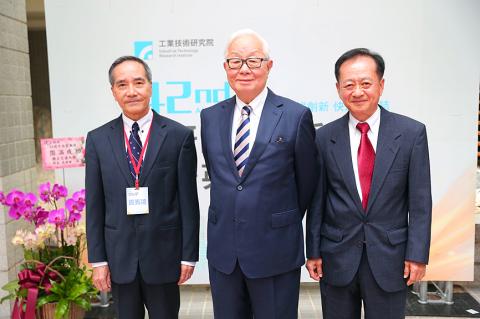Former Taiwan Semiconductor Manufacturing Co (TSMC, 台積電) joint chief operating officer Chiang Shang-yi (蔣尚義) is to take a job at Chinese rival Semiconductor Manufacturing International Corp (SMIC, 中芯國際), the Shanghai-based chipmaker said yesterday.
SMIC’s announcement ruffled feathers in local semiconductor circles, as Chiang is one of the key people who helped TSMC clinch top spot in the global semiconductor market through a slew of technological upgrades.
Chiang retired as vice president of TSMC’s research and development division in 2006, but he was “summoned” to rejoin the company in 2009 by TSMC chairman Morris Chang (張忠謀) to assist with the upgrades to 28-nanometer, 20-nanometer and 16-nanometer technologies.

Photo: Hung Yu-fang, Taipei Times
The advanced chips accounted for 55 percent of the chipmaker’s total revenue last quarter.
In 2013, Chiang, 70, retired again and was tapped as an adviser to Chang for the following two years. That role ended in December last year.
TSMC said that it was informed by Chiang in advance about his new position and that it does not expect it to adversely impact the company.
His position would be part of SMIC’s efforts to enhance its corporate governance and it is not linked to the chipmaker’s operations, TSMC said.
SMIC, the biggest contract chipmaker in China, has been struggling to implement advanced technologies and it lags behind TSMC by about three generations in terms of technology.
TSMC is planning to ship 10-nanometer chips in the first quarter next year, while SMIC is still relying on 28-nanometer chips.
SMIC’s revenue contribution from its 28-nanometer chips increased to 1.4 percent of its overall revenue last quarter, up from 0.1 percent the previous year, according to the company’s financial statement.
TSMC has a more than 70 percent share of the worldwide 28-nanometer chip market.
Chiang would be an independent non-executive director, the company said in a filing with Hong Kong Exchanges and Clearing Ltd.
Chiang does not hold any other position at SMIC or any of its subsidiaries, SMIC said in the filing.
Chiang led TSMC’s research and development as it set milestones in semiconductor technology, from legacy 0.25-micron chips to advanced 16-nanometer FinFET technologies, transforming TSMC from a technology follower to a technology leader, SMIC said.
Chiang is to receive annual cash compensation of US$40,000 and an option to subscribe for 187,500 SMIC ordinary shares, the company said.
TSMC shares fell 1.37 percent to close at NT$180 in Taipei trading yesterday, while SMIC shares slipped 0.76 percent in Hong Kong trading.

RESPONSE: The transit sends a message that China’s alignment with other countries would not deter the West from defending freedom of navigation, an academic said Canadian frigate the Ville de Quebec and Australian guided-missile destroyer the Brisbane transited the Taiwan Strait yesterday morning, the first time the two nations have conducted a joint freedom of navigation operation. The Canadian and Australian militaries did not immediately respond to requests for comment. The Ministry of National Defense declined to confirm the passage, saying only that Taiwan’s armed forces had deployed surveillance and reconnaissance assets, along with warships and combat aircraft, to safeguard security across the Strait. The two vessels were observed transiting northward along the eastern side of the Taiwan Strait’s median line, with Japan being their most likely destination,

‘NOT ALONE’: A Taiwan Strait war would disrupt global trade routes, and could spark a worldwide crisis, so a powerful US presence is needed as a deterrence, a US senator said US Senator Deb Fischer on Thursday urged her colleagues in the US Congress to deepen Washington’s cooperation with Taiwan and other Indo-Pacific partners to contain the global security threat from China. Fischer and other lawmakers recently returned from an official trip to the Indo-Pacific region, where they toured US military bases in Hawaii and Guam, and visited leaders, including President William Lai (賴清德). The trip underscored the reality that the world is undergoing turmoil, and maintaining a free and open Indo-Pacific region is crucial to the security interests of the US and its partners, she said. Her visit to Taiwan demonstrated ways the

GLOBAL ISSUE: If China annexes Taiwan, ‘it will not stop its expansion there, as it only becomes stronger and has more force to expand further,’ the president said China’s military and diplomatic expansion is not a sole issue for Taiwan, but one that risks world peace, President William Lai (賴清德) said yesterday, adding that Taiwan would stand with the alliance of democratic countries to preserve peace through deterrence. Lai made the remark in an exclusive interview with the Chinese-language Liberty Times (sister paper of the Taipei Times). “China is strategically pushing forward to change the international order,” Lai said, adding that China established the Asia Infrastructure Investment Bank, launched the Belt and Road Initiative, and pushed for yuan internationalization, because it wants to replace the democratic rules-based international

RELEASED: Ko emerged from a courthouse before about 700 supporters, describing his year in custody as a period of ‘suffering’ and vowed to ‘not surrender’ Former Taiwan People’s Party (TPP) chairman Ko Wen-je (柯文哲) was released on NT$70 million (US$2.29 million) bail yesterday, bringing an end to his year-long incommunicado detention as he awaits trial on corruption charges. Under the conditions set by the Taipei District Court on Friday, Ko must remain at a registered address, wear a GPS-enabled ankle monitor and is prohibited from leaving the country. He is also barred from contacting codefendants or witnesses. After Ko’s wife, Peggy Chen (陳佩琪), posted bail, Ko was transported from the Taipei Detention Center to the Taipei District Court at 12:20pm, where he was fitted with the tracking